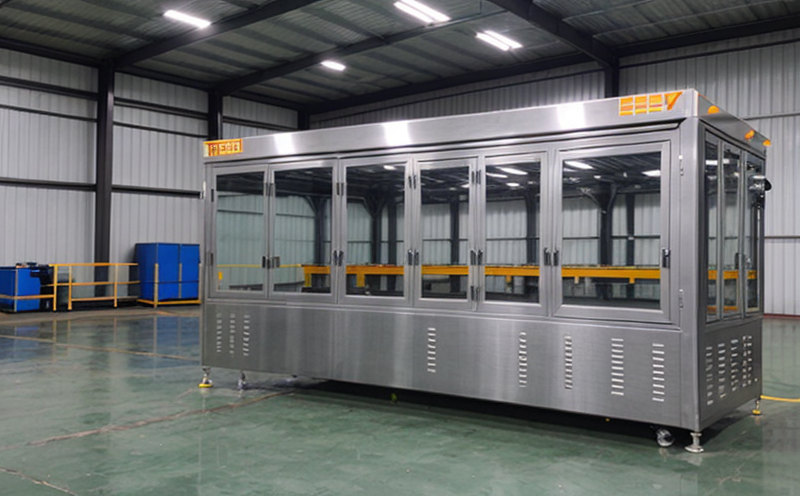ISO 2812-1 Resistance to Liquids Testing
The ISO 2812-1 standard is a globally recognized protocol designed specifically for evaluating the resistance of metal packaging materials and products to various types of liquids. This testing ensures that containers meet the necessary durability standards, which are critical in protecting the integrity of the packaged goods during transportation and storage.
The resistance to liquids test plays a crucial role in ensuring that metallic packaging can withstand exposure to different fluids without compromising the safety or quality of the contents. In this service, we employ stringent ISO 2812-1 standards to conduct comprehensive evaluations on metal packages, providing clients with reliable data and insights into their product's performance.
Our expertise in conducting this test includes understanding the nuances of different types of liquids that may come into contact with packaging materials. For instance, we account for various scenarios such as water intrusion, oil leakage, or chemical spills, which can have significant implications on food safety and product integrity. By adhering to ISO 2812-1, we ensure a thorough assessment of the packaging's ability to withstand these conditions.
The process involves subjecting metal packages to controlled environments that mimic real-world conditions. This includes maintaining specific temperature and humidity levels, as well as applying precise amounts of liquid pressure to test for leaks or breaches in the packaging integrity. Our advanced laboratory equipment allows us to replicate a wide range of environmental factors, ensuring accurate results that can be relied upon by industry professionals.
Furthermore, our team of experienced quality assurance experts ensures that every aspect of the testing process is conducted with precision and accuracy. From specimen preparation through to final analysis, we maintain rigorous standards that align with international best practices. This not only enhances the reliability of our test results but also helps clients make informed decisions about their packaging solutions.
One of the key advantages of ISO 2812-1 testing is its ability to provide detailed insights into potential vulnerabilities in metal packaging designs. By identifying these weaknesses early on, manufacturers can implement necessary improvements, thereby enhancing both the performance and safety of their products. This proactive approach not only protects consumers but also strengthens brand reputation by demonstrating a commitment to high-quality standards.
In conclusion, ISO 2812-1 resistance to liquids testing is an essential service for any company dealing with metal packaging materials. It provides critical information about the durability and integrity of these packages under various liquid exposure conditions. With our comprehensive approach and adherence to international standards, we offer unparalleled accuracy and reliability in delivering robust test results that meet client expectations.
Scope and Methodology
| Test Parameters | Description |
|---|---|
| Liquid Types | Water, oil, acids, alkalis, and other relevant liquids. |
| Temperature Control | Adherence to specified temperature ranges for accurate testing. |
| Humidity Levels | Maintenance of controlled humidity conditions to simulate real-world environments. |
| Liquid Pressure Application | Application of defined pressure levels to assess packaging integrity. |
| Sustained Exposure Time | Determined duration for which the package is exposed to liquid conditions. |
| Visual Inspection Criteria | Identification of any visible signs of leakage or damage on the packaging surface. |
| Leak Detection Techniques | Use of specialized equipment to detect minute leaks that may not be apparent visually. |
Quality and Reliability Assurance
In our commitment to delivering top-tier quality assurance services, we employ a multi-faceted approach that ensures every aspect of the ISO 2812-1 resistance to liquids testing is conducted with precision. Our state-of-the-art laboratory facilities are equipped with advanced instruments and software designed specifically for metal packaging evaluation.
Our team consists of highly skilled professionals who possess extensive experience in conducting such tests. They stay updated with the latest developments in testing methodologies, ensuring that our clients receive cutting-edge solutions tailored to their specific needs. Regular calibration checks on all equipment guarantee consistent accuracy across multiple test cycles.
The entire process is meticulously documented using ISO-compliant reporting formats. This includes detailed records of every step taken during specimen preparation, exposure conditions, and final analysis results. These comprehensive reports serve as valuable resources for ongoing quality improvement initiatives within organizations.
We also prioritize continuous learning by participating in industry conferences and workshops focused on advancements in packaging technology. By staying at the forefront of innovations, we ensure our services remain relevant and effective in addressing current challenges faced by metal packaging manufacturers worldwide.
International Acceptance and Recognition
The ISO 2812-1 standard holds significant importance due to its widespread adoption across numerous industries globally. As a leading provider of this service, we emphasize the value it brings in terms of international acceptance and recognition.
Metal packaging manufacturers who undergo ISO 2812-1 testing can confidently present their results to clients and regulatory bodies worldwide. The standard has been recognized by major markets like Europe (EN), Asia-Pacific regions, North America, and beyond. Compliance with this standard demonstrates a company's commitment to maintaining high standards of product quality and safety.
Furthermore, successful completion of the test adds substantial credibility to your brand image among potential customers and investors alike. It shows that you adhere to stringent international guidelines which are essential for ensuring compliance with local regulations wherever your products are sold.





